
Being a Dad, Mental Health, Q&A
Q&A: Dad Matters UK
Posted on 19th June 2023
Today is International Fathers’ Mental Health Day, an annual event aimed at raising awareness of key aspects of fathers’ mental health. As always, we’re doing a few things to support this event, including this blog post, which we’re really excited about! We’ve spoken to the amazing ‘dad-vocate’ (and good friend of DadPad), Kieran Anders, Operations Manager at Dad Matters UK, about the work that he and his growing team are doing, across the UK, to support dads to have successful relationships with their families and to support dads experiencing anxiety, stress and mental health issues.
Kieran also kindly got some of his colleagues to also speak to us. Here’s what they all had to say…
Hi Kieran. Can you please start by letting us know a bit more about when and why Dad Matters was first set up?
K: Dad Matters was first developed in May 2017. It is a collaboration between Home-Start HOST and the Early Attachment Service in Tameside, Greater Manchester, with the aim of supporting dads within a perinatal and parent/infant mental health pathway.
There was some amazing work already happening that was supporting families with parent/infant relationships, attachment and bonding, and mental health in the perinatal period. In Tameside in particular, there were some real benefits being gained from a whole system pathway of embedded support, including an innovative project with Home-Start HOST where they had trained volunteers offering peer support in the home. Unfortunately, the great successes that this partnership was delivering weren’t seen in relation to dads and male carers.
In the first year of the project, we did a lot of consultation and co-production, not only with dads but also with the professionals who wanted to reach dads. We came up with the brand, the colours, the resources, and developed our innovative, tiered approach, with engagement becoming a non-negotiable part of how we interact with dads in order to create the right platform and conditions for them to access our support and the support within the pathways they so often avoid.
We also worked with dads to develop a new way of recruiting volunteers within a family support framework, utilising volunteers for universal engagement and group support, rather than one-to-one support as the Home-Start model does. This meant we could reach out to more dads and still offer them the opportunity to become family support volunteers through our colleagues in other Home-Start projects.
What does Dad Matters aim to offer?
K: Dad Matters is a Home-Start HOST project, and we see ourselves as a parent/infant service, aimed at dads with under 2s or expecting. We focus our support in three areas:
- Attachment and bonding is our key objective, with education, experience, knowledge, and understanding of what babies want and need from us being a crucial part of what we offer;
- Helping dads acknowledge their emotional and mental health wellbeing, finding solutions to any challenges they may face and making sure they feel empowered to reach out, when they need to, to any service that feels like a good fit to them; and
- Encouraging dads to find out more about the services supporting their family, and how they can be more involved, supported by and included in the team around their child.
We do all of this through three layers of work:
- Firstly, universal engagement, such as within antenatal and postnatal clinics, events, walk-and-talks, social media and our website, and through professionals who may see dads in appointments. This builds a confidence in our service that encourages dads to acknowledge us, and our partners, as something that is very much there for them. This can lead into other areas of our work, into statutory referral pathways, or into third sector support;
- Secondly, we see dads in targeted outreach situations. This is very much dependent on areas and relationships with services, but can include: dad chats in antenatal classes, neonatal unit walk arounds, Mother and Baby Unit (MBU) drop-ins, army base drop-ins, and work in prisons, with schools and family nurse partnerships, etc; and
- Finally, we offer one-to-one peer support through our co-ordinators. These referrals can be made by professionals in the perinatal mental health pathway or other services around families, or via self-referrals directly from dads.
The main points to bear in mind are:
- We don’t isolate dads from services they already feel isolated from – we work closely with services to make sure that dads can reach them; we don’t offer ‘alternative’ support’. Instead, we aim to complement what dads can already access, but often don’t.
- Always ask again – even if dads say they are OK (or say they’re OK when you ask them), asking again and again builds up a reassuring knowledge for the dad that you are a viable option for support. He might rely on this knowledge later…
- We don’t ask dads to reach out to reach us – we go to them – in antenatal appointments, neonatal units, MBUs, services, etc.
- We signpost and support access to services – not every approach will suit every dad, so we try to engage with as many other services and organisations as possible.
- We don’t tell dads that they need to open up more to access support – we make sure that they have information and education, resources and access to peer support that can help support their wellbeing earlier and encourage them to acknowledge their own wellbeing.
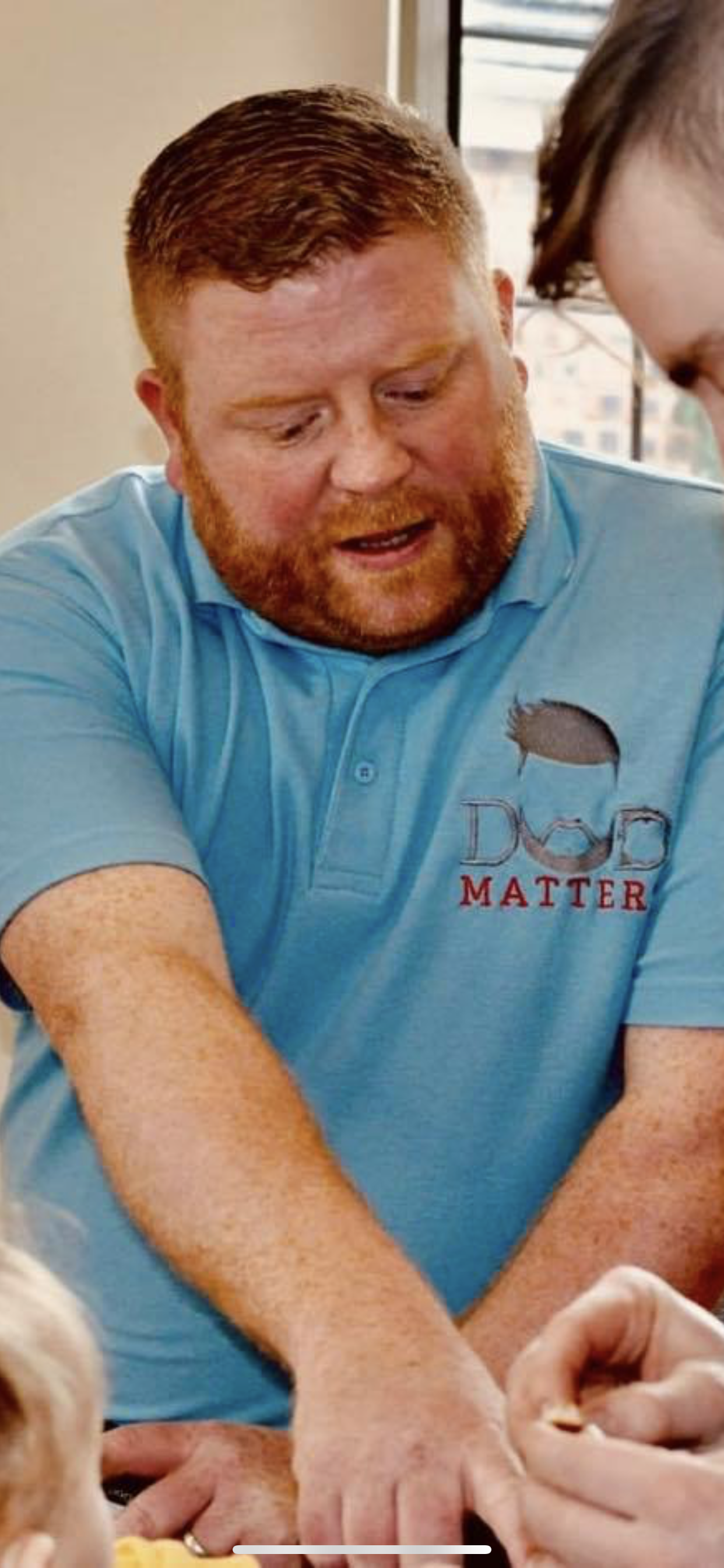
How many areas are you in now?
K: We have Dad Matters covering the whole of Greater Manchester – funded through the Greater Manchester perinatal mental health pathway and Maternal Mental Health Service. We also have some roles being developed through the local Family Hubs’ funding.
We also have co-ordinators in Gloucestershire, who were the first Home-Start schemes outside Manchester to work with us to develop a Dad Matters project there.
Since then, we have recruited more and more co-ordinators through partnerships with 16 other Home-Start schemes, including in Salford, Somerset, Cymru, Blackpool, Fylde & Wyre, Warrington, Knowsley, Leeds, Warwickshire, and a consortium of schemes covering the north of Surrey. We haven’t finished yet, with many more schemes talking to us about the opportunity.
Whilst we’re looking at areas of the country covered by Dad Matters, Kieran mentioned to us that the team now have two female co-ordinators – Josie in Warrington and Abi in Warwickshire. He put us in touch so that we could also have a quick chat with them. We first asked them both what about drew them to take up their positions and work with dads…
A: My own father passed away when I was a baby, so I know the impact that it had on me, growing up without a dad. When I had my own children, I saw first-hand the impact this had on my husband and some of the issues he faced. I had always championed dads and was frustrated when I saw them often being ignored or marginalised as a parent. It was actually a friend of mine who told me about this role, as they knew how passionately I felt and thought I would be a good fit for the role.
J: The way my husband and I became parents was not what we planned or expected. Both of our boys were premature, with our eldest born at 26 weeks + 5 days gestation and then, two years later, our youngest born at 28+3. Our hospital journey was incredibly tough – we had a crash course in nursing and worse-case scenarios and, through it all, my husband felt like he had to provide support: for me postnatally, for us financially and for friends and family who were worried about us. He felt very alone – who was there to support him? He didn’t have the time or the energy to chat to friends or family. He would receive bad news whilst sat at his desk at work and have to keep it together in front of his colleagues. He felt he had to keep it together and be strong for his family, and so he buried it. He buried it when he found out our youngest had severe allergies and experienced anaphylaxis three times. He buried it in order to cope when he couldn’t cope. He buried it all. He would describe himself as a work in progress but, with help, when he finally started talking, the weight started to lift off his shoulders.
After what we went through, I knew I wanted to help people, so I co-founded a neonatal peer support group in Warrington and listened to parents talk; I know that I really made a difference. When I saw the job advertised for a Dad Matters Co-ordinator in Warrington, I knew I had to apply – I have a dad, I have a husband who is a dad, and I have two sons who one day may become dads. It is important to me that dads get the same support as mums, especially if they are struggling.
How have you found it, working as female co-ordinators within a dad-focused organisation? What strengths/benefits do you think you’re able to bring to your roles?
A: I have been welcomed by everyone I have come into contact with, which has been fantastic! I have learnt a great deal from my colleagues, and I also feel that I’m able to bring a new perspective to the role. In a role such as this, empathy and communication are vital, which I consider to be strengths of mine.
J: The Dad Matters team have been incredibly welcoming and supportive, and I am lucky to be working alongside fellow Co-ordinator Chris in Warrington – he describes us as ‘Yin and Yang’, which I hope is a good thing – ha ha! The two of us work well together and, being able to offer both a male and female perspective on some things has been hugely helpful. Initially, I was nervous about whether being female would have an impact on the job, but it hasn’t and part of this job involves working with a lot of female professionals (doctors, nurses, charity partners, early years support workers, etc).
On a personal level, I am super-organised, get stuck in and have a direct and honest approach. I have excellent co-ordination skills and Google is my friend. I’ve offered peer support to dads when I was volunteering and mostly worked in supply chain roles previously, so I’ve spent a large part of my career working closely with men. At our Dad Drop-Ins and Walk and Talks, dads have been more than happy to talk to me.
Dad Matters Warrington also have some fantastic volunteers so we make sure they are supported and that all of our events have at least one dad there to chat to other dads. I only start in this role in January 2023, and every day is a school day! I’m learning lots of new things and also tweaking some previous ways of thinking.
Since working with Dad Matters and with new dads, what insights have you gained into the pressures and worries most commonly faced by dads today, that you perhaps weren’t aware of beforehand?
A: I think the lack of support surprised me, especially the way that dads are often not included within the perinatal journey. Practical pressures, such as the difficulties surrounding paternity leave, have also been a real eye-opener, too.
J: Becoming a parent is such a massive, life-changing event. No one can tell you what is going to happen at the birth and how you’ll find your ‘new normal’ once baby arrives. I feel like I maybe took for granted that dads don’t quite get the same information or support as mums. In my case, I made assumptions that my husband would be confident, follow my lead, and just know what to do. I didn’t necessarily think about the impact having a baby would have on him emotionally. I think the online New Dad Chats that Dad Matters run are fantastic for first-time dads. The information is presented by dads and those attending get the opportunity to talk and listen to other dads about being a dad. Dad Matters is doing incredible work and I’m so pleased I am part of it.
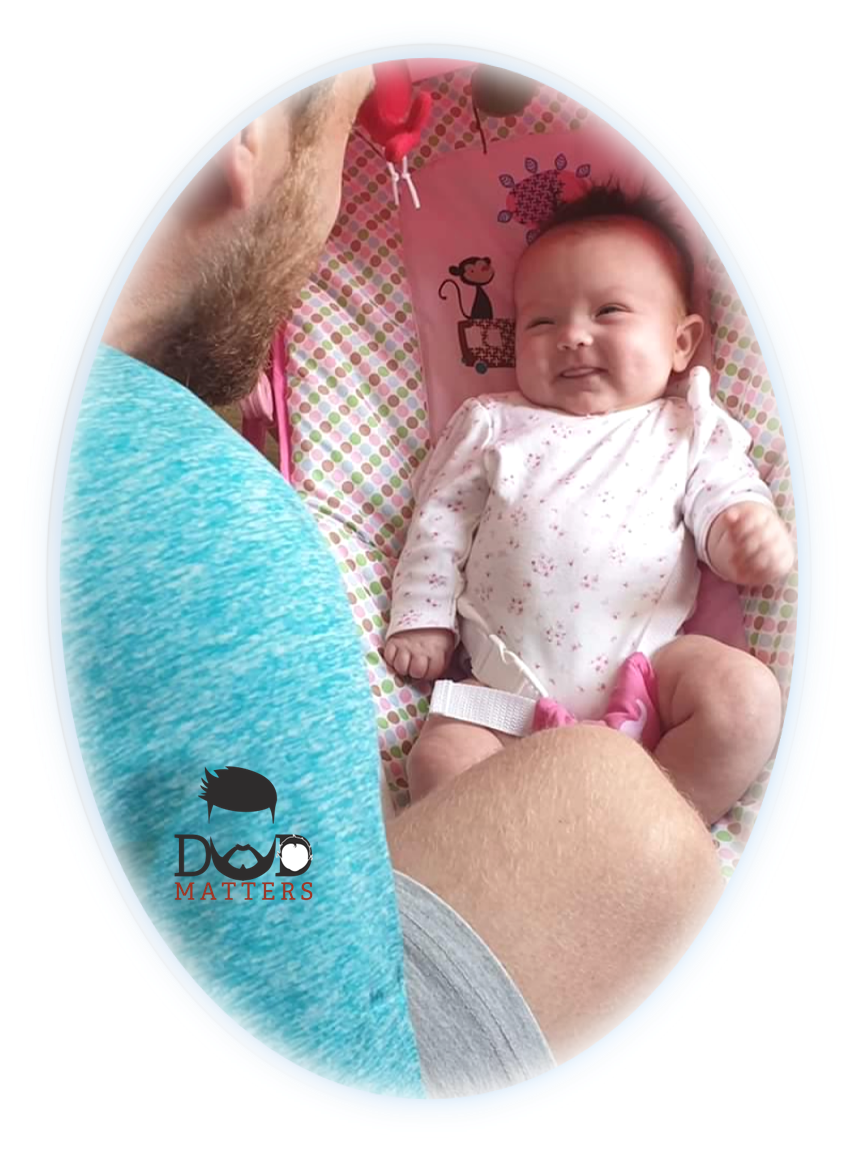
We can remember have a phone chat with you, Kieran, back during lockdown in 2020, and you were talking to us from a windy hospital car park… Tell us a little more about that time, as you were doing some really important work with dads…
K: When Covid hit, we were seeing hundreds of dads each week in our antenatal Dad Chats. These were groups that we delivered within the antenatal classes that Midwives were offering. We were also seeing even more dads through our outreach sessions at antenatal clinics, and had dozens of dads that we were working with directly in referral. When all of this stopped, we developed a number of contingencies to help us keep each part of the project going.
For our Dad Chats, we developed an online New Dad Workshop. This is still running, is free to access, and can be booked through our website. For our one-to-ones, we reverted to phone and video calls, even offering Newborn Behavioural Observation appointments over a WhatsApp video. For the outreach, we worked with hospitals, particularly Bolton, to ensure a Covid-safe way to reach dads who were waiting.
We did some research by driving through car parks at the hospitals, and we saw that – at any one time – there could be as many as 35 dads waiting in cars or outside the entrances. We wrote our risk assessments, spoke to midwives, hospital estates and infection control leads to ensure we and the dads we wanted to reach would remain safe, and we started our pop-up shops. This basically meant having a stand outside Maternity, speaking to dads at a distance, offering resources that had been sterilised with spray, and collecting testimonials and experiences of dads, which we passed onto the maternity leads, Maternity Voices Partnerships (MVPs) and commissioners.
One dad called us while he was waiting outside a Birth Centre in a storm; he had seen our poster in the window. We managed to speak to the Head of Midwifery and, within minutes, they had altered their waiting areas to include a space for birth partners.
In the end, we passed over 100 testimonials to service leads, which included dads who: slept in cars for two days; ordered Uber Eats to the car park because they didn’t know how long they would have to wait; and paid £60 for a taxi to a scan, only to be told the restrictions had changed and he would have to stay outside… We also spoke to dads who were supporting mums over the phone, after receiving some difficult news.
Some of our Covid-adaptations have remained and provide a great richness to our offer: remote working, online education, phone and video contact with referrals, and the close relationships we have built with maternity services and MVPs. Our face-to-face antenatal dad chats have only recently returned this year, due to a number of factors, but mainly because midwives haven’t reinstated their education offers yet.
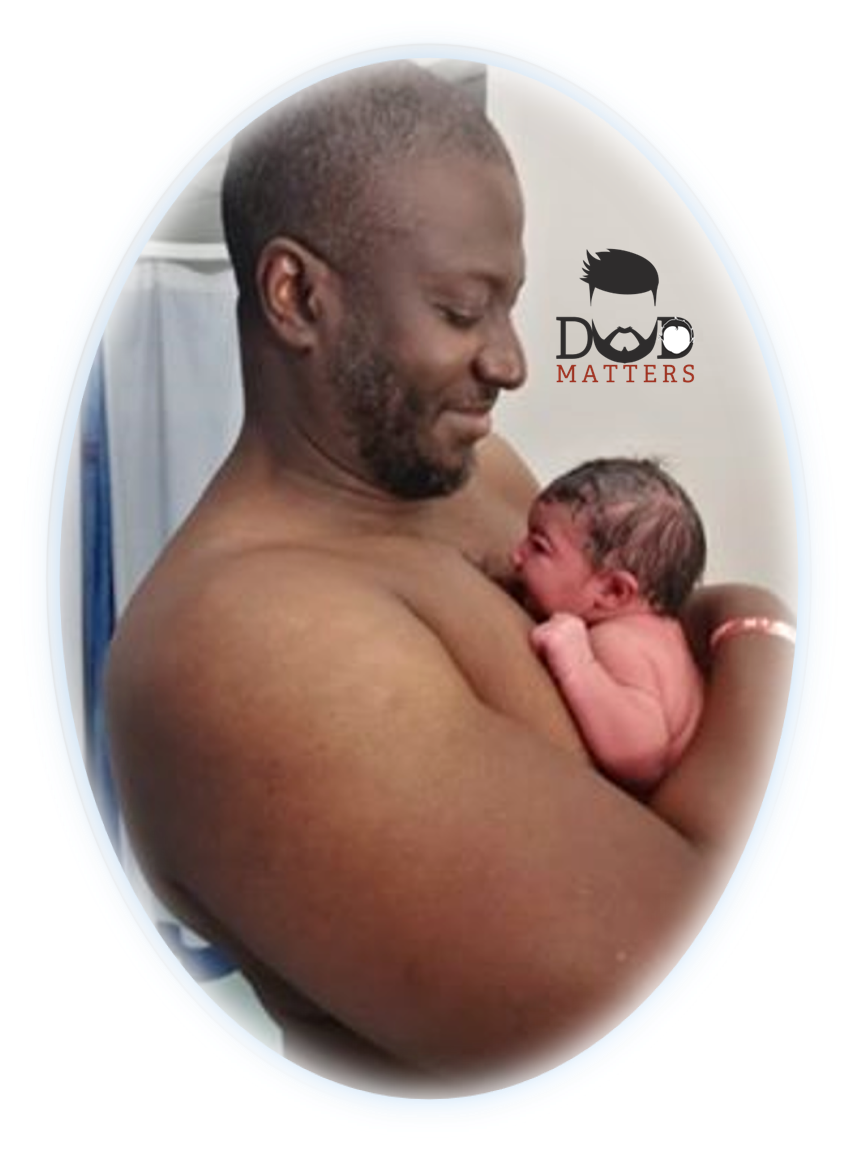
Where do you feel that your support is most needed? And what do you see as the biggest challenge to men-as-dads in 2023 and into the future?
K: We are a perinatal service, aimed at dads, because the gap in service-access and the isolation that dads report feeling during this period all tells us that engaging dads with information, education and support here will help them to develop a better understanding of their role, what their child needs from them, and how to ensure they are involved beyond the perinatal period. We know that the biggest time period for baby brain development is the first 1001 days, so encouraging dads to find out more about their unique impact here can play a vital role for babies, too.
Some of the challenges that we are seeing are around that work-life balance. After Covid, more dads have experienced staying at home and being more present, and want to be able to do more of that. Some dads are dealing with the trauma of being unable to support their partner during restrictions and having had less opportunity for bonding.
There are also challenges around how services for dads are being developed. Funding, innovation, being embedded within statutory services, and creating dads’ services without learning from past attempts are all making it more challenging to engage with dads and therefore support them with more specific things.
There is a stereotypical view that “dads need a dads’ group” which just doesn’t hold up when we’re trying to support dads earlier and with specific challenges. There is a place for dads’ groups – we support some amazing organisations with training, referral pathways and drop-ins, but we don’t run our own play and stay groups unless there isn’t one locally.
There is also a tendency by services to cling to any organisation with “Dad” in the title. However, there is such a diverse offer for dads now that it’s really important we spread the word that not all dad-focused organisations are doing the same thing. There are resources for dads, like online education platforms and apps, that can support dads with information and education. They can also support services and professionals to engage with dads. DadPad is a shining example of that, and a resource we share in all of our areas. There are advocates, campaigners and researchers who do an amazing job of highlighting the needs, challenges and success of dads, but aren’t a support service. Then there are support services, specifically for dads, where they reach dads directly and offer one-t0-one support, referrals, signposting and appropriate interventions. I feel like Dad Matters straddles each of these offers in one way or another, but what we also do is try to work with other organisations, to ensure that dads get what is right for them at a suitable time, even if that isn’t us.
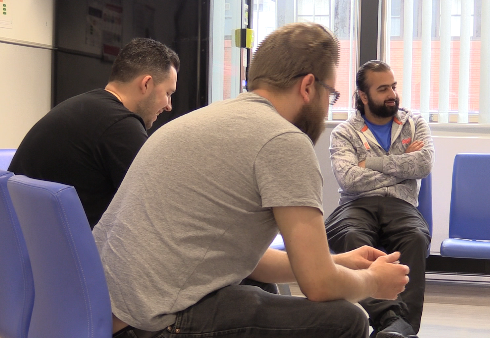
What’s coming up for Dad Matters this year – and beyond?
K: We have a first aid workshop that we have piloted, developed by Eric, our Blackpool, Fylde and Wyre co-ordinator, who is also a very experienced first aid trainer. This was inspired by Mike, one of our volunteers, who came to us as a referral after he delivered life-saving CPR on his newborn son. Mike is supporting us to get the message right, and not only talk about first aid for babies and toddlers, but also about how we need to acknowledge the impact having babies can have on our wellbeing and what we can do to manage it.
We have also started some work in prisons, offering a drop-in for dads with under 2s. They’ve asked for support with understanding how to interact with babies on visits, and how to build that bond before they are released and join the family on the outside. We are also taking referrals from a prison of released inmates with an under 2 at home – we are hoping to develop this project further.
As ever, we are working with other Home-Start schemes to develop a Dad Matters project in their area, and are looking at how we can develop this work further. We have worked with Home-Start Worldwide, and had conversations with Home-Start schemes in lots of countries – Japan, Hungary, the Netherlands, Australia and Canada, amongst others – so we are hoping to develop these international links further.
We are also working with the Institute of Health Visiting (iHV), co-delivering fathers’ mental health training to professionals across the country, and will be at the iHV’s Perinatal & Infant Mental Health (PIMH) Conference on International Fathers’ Mental Health Day. We’ve also recently done some work with Alright Mate? CIC to develop some short video reels highlighting male postnatal depression which we hope to launch on the same day.
All in all, we want to continue reaching dads, offering information and education and finding them the right support. We see thousands of dads each year, and we know we can do more!
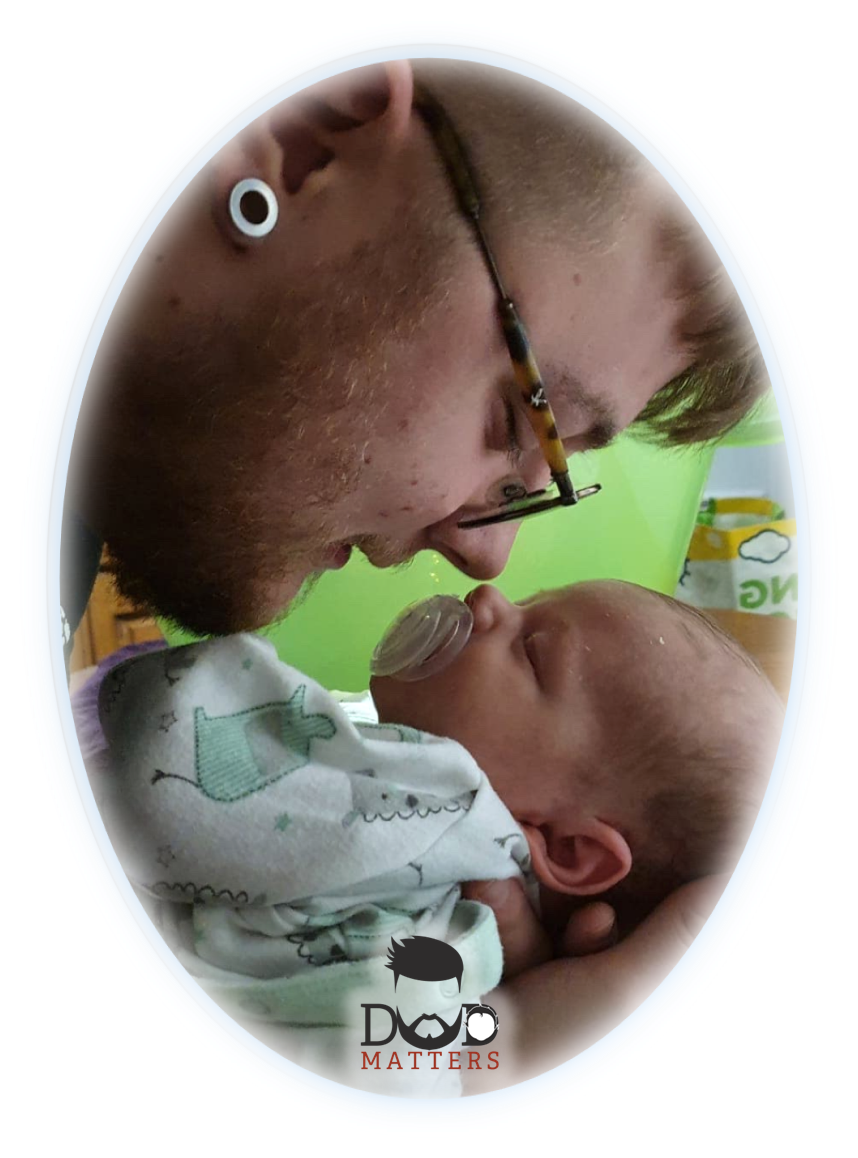
Finally, let’s end this lovely, inspiring chat with some feedback and testimonials that Dad Matters have received over the years, just in case you still need convincing of what an amazing job they are doing…
What do dads think of the Dad Matters service?
- It’s great to get out of the house, especially knowing I’m going to see other dads who understand a bit about my life
- It’s great that this exists. I’ve got an older son who is 11 and I really could have done with something like this first time round.
- Dad Matters has been a God-send for me, with regular chats, flexible times when you can talk, and signposting to services like Home-Start (Wigan) spoons and BABs.
What do mums think of the Dad Matters service?
- I’ve got lots of support for my issues, from the attachment service and perinatal team but, until we found you, my partner had no support.
- It’s really helped me to focus on getting better, knowing he has support, too.
- Dad Matters has helped my husband to feel more included in our family.
What do professionals think of the Dad Matters service?
- Before we could refer to Dad Matters, we were literally telling dads there wasn’t a service for them.
- Having a dad-focused service has meant dads are better equipped and don’t feel as isolated, even when we work more closely with mums.
- The Dad Matters Co-ordinator really feels like a close part of our team, within our team meetings, away days and even our social meet-ups.
- The knowledge and experience within the Dad Matters team really helps us to learn more about the dads we see, and work with them more closely.
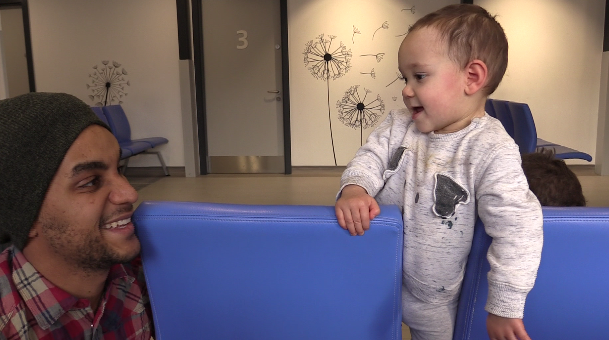
For more information on Dad Matters UK…
- Website – home page
- Find a Dad Matters team in your area
- Online New Dad workshops
- Social Media (main accounts): Twitter, Instagram, Facebook and YouTube
- Local Dad Matters Facebook groups:
- Specific/Private Dad Matters Facebook groups:

